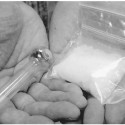'Women and Methamphetamine' workshop in Fortuna raises awareness
It’s a success story in an area with too few success stories. When she was 19 years old, Kim Selby came to Humboldt County to grow pot. Then she became addicted to methamphetamine. Today, she is off the drug and runs a clean and sober house for women in Fortuna. The nine women who live there are learning how to move on with their lives after addiction to methamphetamine.
Kim and those who are helping people with this addiction attended a training last Friday entitled Women and Methamphetamine. Kim said that one of the most important things she got from the workshop was just knowing that someone cares. She liked the fact the presenters made it clear that “everyone is on a different level. The same treatment doesn’t work for everyone.”
The program featured Rivka Greenberg, PhD and Deborah Werner, MA. and was aimed not only at women with addiction, but also at their children. Their aim is to integrate knowledge and skills gained from research with the work of people who work with addicts. Early in the day they gave an overview of how women with the problem differ from men. One example is that most of the women have experienced either sexual or physical abuse, or both.
They went on to discuss different treatments for women addicted to the drug.
Helene Barney, Senior Program Manager in Adult Behavioral Health and Recovery Services, brought the program to Humboldt County because she was impressed with their research and consideration of all methods of treatment.
According to Leslie Lollich, Public Education and Outreach Director for Humboldt County Health and Human Services, two thirds of all admissions to drug treatment in Humboldt County are due to methamphetamines.
Most of the people who attended the day session work with addicts in areas like public health, social services, and mental health.
Kim Selby manages a safe house called Redwood Recovery in Fortuna. Each of the 9 women living there is in a 12 Step program, has a sponsor, and is working through the steps. Also, each woman is either working, in an outpatient program, or enrolled in school. All are free of drugs.
They can stay there as long as they’re actively involved with the 12 step program, the meetings, a sponsor, and working through the steps. Kim knows the importance of the program. She worked through her own recovery in this same house.
One motto of Narcotics Anonymous, NA, is “You can’t keep it unless you give it away.” Kim is actively doing this by her work in the house.
There is a waiting list of women who want to live in the house, who want the support while they recover. And, according to Kim, “there is a grave need for more programs.”
Kim acknowledges that no one program works for all people. The program presented in Friday’s workshop was different from the 12 Step program. A variety of programs are needed to help people recover from addition to methamphetamines.
Sue Daeger, who works with Humboldt Alcohol Rehabilitation Treatment (HART), and also attended the workshop, agreed with Kim that more help is needed. “These women need help in filling out a job application, going to the interview, and even signing up for school” she said.
Kim and Sue both welcomed the opportunity to get together, to network. Sue works with people before they reach the stage of recovery where they can live in a safe house. At one point, Kim was in Sue’s program. They were especially pleased that the program addressed the special needs of women.
_______
source: The Humboldt Beacon, http://www.humboldtbeacon.com
